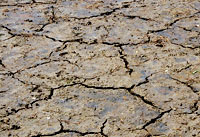At press time, Buncombe County was considered to be in a “severe drought”—just a notch below the “extreme drought” in the westernmost counties, according to state Department of Environment and Natural Resources nomenclature.

Color-coded charts aside, the real-world effects of drought are obvious. Plants are droopy. You have to drink more fluids to stay hydrated in the heat. Rushing rivers slow to a tame trickle. And despite gray skies and scattered showers, the long-awaited downpour never seems to arrive.
North Carolina has received only half as much rainfall as it would typically have had by this time of year, according to Jamie Kritzer, a public-information officer with DENR. All 100 counties in the state are either experiencing some level of drought or are considered abnormally dry, he notes. And 33 public water-supply systems have imposed restrictions on water use.
“Public water supplies in N.C. are OK,” notes Kritzer. “But we are starting to see a decline, because of the lack of rainfall, in our reservoirs and our stream flows. The warning is, we need to conserve water now. If these dry conditions continue, it could get a lot worse toward the end of the summer.”
One simple way to conserve is to cut back on watering the lawn. “If you want to keep it green, it will need an inch of water every week,” notes Linda Blue, an agricultural extension agent with the N.C. Cooperative Extension Service. But if you don’t care so much about aesthetics, your lawn will be fine with an inch of water every three weeks, she adds. Blue suggests watering in the early morning or late evening to reduce evaporation. And when using a sprinkler system, “you don’t particularly want to water your driveway,” she adds with a laugh.
For gardeners, using mulch or compost can help retain moisture in the soil. And when you do go out to water, says Blue, don’t be stingy. “Water thoroughly—the usual recommendation is an inch of water at a time, once a week for veggie gardens. It’s an efficiency issue. If you are going to water, put down enough water to do some good, so that it will get to the roots.” Dousing plants with a sprinkle here and there will just lead to more evaporation, says Blue.
Among the more creative ways to conserve water is rainwater harvesting. “Instead of using your well for things like landscape irrigation, you can use rainwater as a supplemental resource,” says Shawn Hatley, who heads up Blue Ridge Atlantic Enterprises, an Oakboro, N.C.-based company that specializes in rainwater-harvesting equipment. “A typical 2,000-square-foot roof area could get between 60,000 and 80,000 gallons a year” of rainwater, says Hatley. Using cisterns to store rainwater collected from the roof is a simple way to make it available for outdoor use. But remember to cover your bins with netting, or you’ll inadvertently create an excellent breeding ground for mosquitoes.
Meanwhile, Gracia O’Neill of Clean Water for North Carolina brings up a less obvious point about water use: “Over 8 billion gallons of water per day are used to cool coal and nuclear facilities in North Carolina,” she writes in a blog post that can be found at sustainablewnc.org. Conserving electricity, she notes, is yet another way to protect our water resources.
Of all the conservation methods, however, few are as rewarding as this tried-and-true advice: “Save water, shower with a friend.”
To learn more about drought conditions in Western North Carolina, visit www.ncdrought.org





Before you comment
The comments section is here to provide a platform for civil dialogue on the issues we face together as a local community. Xpress is committed to offering this platform for all voices, but when the tone of the discussion gets nasty or strays off topic, we believe many people choose not to participate. Xpress editors are determined to moderate comments to ensure a constructive interchange is maintained. All comments judged not to be in keeping with the spirit of civil discourse will be removed and repeat violators will be banned. See here for our terms of service. Thank you for being part of this effort to promote respectful discussion.